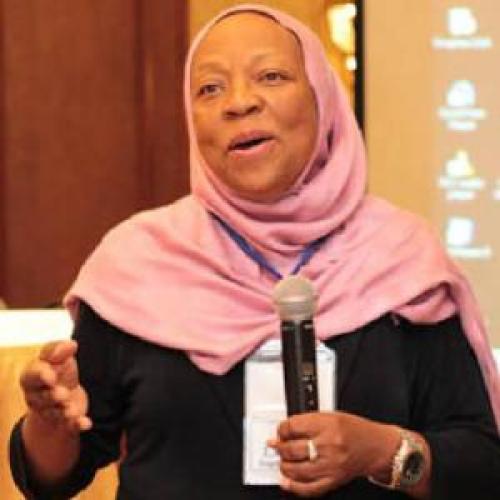cum laude with Distinction in all Subjects
B.A.
Cornell University
1972

Dr. Fatimah Jackson received her Ph.D., M.A., and B.A. (cum laude with Distinction in all Subjects) from Cornell University. Her doctoral dissertation research was on The Relationship of Certain Genetic Traits to the Incidence and Intensity of Malaria in Liberia, West Africa. She has conducted research on (and is particularly interested in): 1.) Human-plant coevolution, particularly the influence of phytochemicals on human metabolic effects and evolutionary processes and 2.) Population substructure in peoples of African descent, developing Ethnogenetic Layering as a computational tool to identify human microethnic groups and differential expressions of health disparities. Trained as a human biologist, Dr. Jackson has published extensively in such journals as Human Biology, Biochemical Medicine and Metabolic Biology, Journal of the National Medical Association, American Journal of Human Biology, Annals of Human Biology, BMC Biology, and most recently the American Journal of Public Health. Dr. Jackson's research has been funded by: USAID, Ford Foundation, Huber Foundation, Rockefeller Foundation, NIH (NIMHD and NHGRI), Wenner-Gren Foundation, and EPA. Dr. Jackson has taught at Cornell University, University of California - Berkeley, University of Florida, University of Maryland - College Park (where she is Distinguished Scholar Teacher and Professor Emerita), University of North Carolina - Chapel Hill and now at Howard University. She has been a Visiting Scholar at University of Georgia and University of Khartoum in Sudan and she was a Senior Fulbright Fellow in Egypt. She has been awarded the Nick Norgan Award for 2009 Best Article Published in Annals of Human Biology. In 2012 she was the first recipient of the Ernest E. Just Prize in Medical and Public Health Research, Avery Research Institute, College of Charleston and Medical University of South Carolina (University of South Carolina). In 2012, she was also Coined by Rear Admiral Dr. Helena Mishoe, National Institutes of Health, NHLBI and US Public Health Service.
B.A.
Cornell University
1972
M.A.
Cornell University
1978
Ph.D.
Cornell University
1981
Research, Fletcher Foundation, Oasis Scientific, (2006 - 2009) PI
Research, NIH-NIMHD and NHGRI, Wenner-Gren Foundation (2011-2012);
PI for International Conference on The Genetics of the Peoples of Africa
and the Transatlantic African Diaspora, 2012
Research Training, Marie Curie Actions, EUROTAST, EU. (2012-2017) Associate Partner
Cooperative Agreements with National Park Service. (2013-present) PI
The Jackson Research Laboratory
The Jackson Research Lab focuses on the development of models to facilitate our understanding of human diversity and microevolution. Towards that end, the Jackson Research Laboratory is focused on integrative assessments of gene-environment interactions including human-plant coevolution, epigenomic consequences of cultural practices, anthropological genetics, and quantification of social and behavioral factors influencing human biology.
The Cobb Research Lab houses the remains of the Cobb Collection of Human Skeletal Remains and the New York African Burial Ground. Scholars interested in the skeletal and dental biology, genetics, disease history, and social history of these collections are invited to conduct research on these collections. Dr. Fatimah Jackson is the Director and Curator of the Cobb Research Laboratory.
Cobb Research Lab Office 232 Douglass Hall
Cobb Research Lab Telephone: 202-806-5019
Jackson F, Jackson L, Cross C, Clarke C. What could you do with 400 years of biological history on african americans? Evaluating the potential scientific benefit of systematic studies of dental and skeletal materials on African Americans from the 17th through 20th centuries. Am J Hum Biol. 2016 Jul;28(4):510-3. doi: 10.1002/ajhb.22821. Epub 2016 Jan 9.
Jackson F and Cross C 2015 Applying Next Generation Science Standards in the Cobb Research Laboratory. The Backbone vol 1 no. 1 Spring 2015. http://www.cobbresearchlab.com/issue-1/2015/1/26/sk2by7uuny8if3aku45ty3n...
Jackson F 2015 The Cobb Collection: Current Status and Future Research Directions. Am J Hum Biol.. 2015 Mar 4;27(2):233-4. doi: 10.1002/ajhb.22692. http://onlinelibrary.wiley.com/doi/10.1002/ajhb.22692/full
Obuobi SR and Jackson F 2014 A Study on the Receptivity to Cancer Prevention Among African American Muslims. Journal of Social Science for Policy Implications. 2(2) June:01-17. http://aripd.org/journals/jsspi/Vol_2_No_2_June_2014/1.pdf
Jackson F, Lee CM, Taylor S. Let minority-serving institutions lead. Science. 2014 Aug 22;345(6199):885. doi: 10.1126/science.345.6199.885-c.
Jackson, FLC 2014 Gene–environment interactions in human health: case studies and strategies for developing new paradigms and research. Frontiers in Genetics, 29 August 2014 | doi: 10.3389/fgene.2014.00271methodologies http://journal.frontiersin.org/Journal/10.3389/fgene.2014.00271/full
Jackson, FLC; Niculescu MD, and Jackson, RT 2013 Conceptual shifts needed to understand the dynamic interactions of genes, environment, epigenetics, social processes, and behavioral choices. American Journal of Public Health. October 2013, Vol. 103, No. S1, pp. S33-S42.doi: 10.2105/AJPH.2013.301221
Jackson, F. 2006 Illuminating cancer health disparities using ethnogenetic layering (EL) and phenotype segregation network analysis (PSNA). J Cancer Education 21(1):69-79. http://ukpmc.ac.uk/abstract/MED/17020506
Jackson, FLC 2005 Response to Armelagos commentary on the “Slavery Hypertension Hypothesis” Transforming Anthropology 13(2):125-135. http://onlinelibrary.wiley.com/doi/10.1525/tran.2005.13.2.125/abstract